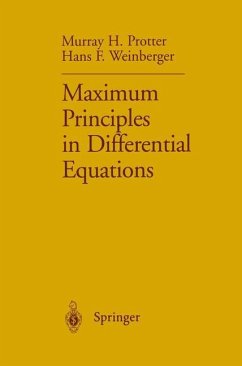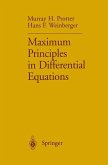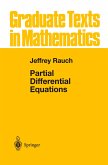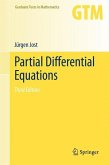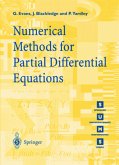- Gebundenes Buch
- Merkliste
- Auf die Merkliste
- Bewerten Bewerten
- Teilen
- Produkt teilen
- Produkterinnerung
- Produkterinnerung
Maximum Principles are central to the theory and applications of second-order partial differential equations and systems. This self-contained text establishes the fundamental principles and provides a variety of applications.
Andere Kunden interessierten sich auch für
![Maximum Principles in Differential Equations Maximum Principles in Differential Equations]() Murray H. ProtterMaximum Principles in Differential Equations90,99 €
Murray H. ProtterMaximum Principles in Differential Equations90,99 €![Partial Differential Equations Partial Differential Equations]() Jeffrey RauchPartial Differential Equations53,99 €
Jeffrey RauchPartial Differential Equations53,99 €![Partial Differential Equations Partial Differential Equations]() Jeffrey RauchPartial Differential Equations38,99 €
Jeffrey RauchPartial Differential Equations38,99 €![Partial Differential Equations Partial Differential Equations]() Jürgen JostPartial Differential Equations45,99 €
Jürgen JostPartial Differential Equations45,99 €![Partial Differential Equations Partial Differential Equations]() Jürgen JostPartial Differential Equations64,99 €
Jürgen JostPartial Differential Equations64,99 €![Seminar on Nonlinear Partial Differential Equations Seminar on Nonlinear Partial Differential Equations]() Seminar on Nonlinear Partial Differential Equations115,99 €
Seminar on Nonlinear Partial Differential Equations115,99 €![Numerical Methods for Partial Differential Equations Numerical Methods for Partial Differential Equations]() G. EvansNumerical Methods for Partial Differential Equations27,99 €
G. EvansNumerical Methods for Partial Differential Equations27,99 €-
-
-
Maximum Principles are central to the theory and applications of second-order partial differential equations and systems. This self-contained text establishes the fundamental principles and provides a variety of applications.
Produktdetails
- Produktdetails
- Verlag: Springer / Springer New York / Springer, Berlin
- Artikelnr. des Verlages: 978-0-387-96068-5
- 1st ed. 1967. Corr. 2nd printing 1984
- Seitenzahl: 276
- Erscheinungstermin: 22. Oktober 1984
- Englisch
- Abmessung: 241mm x 160mm x 20mm
- Gewicht: 582g
- ISBN-13: 9780387960685
- ISBN-10: 0387960686
- Artikelnr.: 22285802
- Herstellerkennzeichnung
- Springer-Verlag GmbH
- Tiergartenstr. 17
- 69121 Heidelberg
- ProductSafety@springernature.com
- Verlag: Springer / Springer New York / Springer, Berlin
- Artikelnr. des Verlages: 978-0-387-96068-5
- 1st ed. 1967. Corr. 2nd printing 1984
- Seitenzahl: 276
- Erscheinungstermin: 22. Oktober 1984
- Englisch
- Abmessung: 241mm x 160mm x 20mm
- Gewicht: 582g
- ISBN-13: 9780387960685
- ISBN-10: 0387960686
- Artikelnr.: 22285802
- Herstellerkennzeichnung
- Springer-Verlag GmbH
- Tiergartenstr. 17
- 69121 Heidelberg
- ProductSafety@springernature.com
1. The One-Dimensional Maximum Principle.- 1. The maximum principle.- 2. The generalized maximum principle.- 3. The initial value problem.- 4. Boundary value problems.- 5. Approximation in boundary value problems.- 6. Approximation in the initial value problem.- 7. The eigenvalue problem.- 8. Oscillation and comparison theorems.- 9. Nonlinear operators.- Bibliographical notes.- 2. Elliptic Equations.- 1. The Laplace operator.- 2. Second-order elliptic operators. Transformations.- 3. The maximum principle of E. Hopf.- 4. Uniqueness theorems for boundary value problems.- 5. The generalized maximum principle.- 6. Approximation in boundary value problems.- 7. Green's identities and Green's function.- 8. Eigenvalues.- 9. The Phragmèn-Lindelöf principle.- 10. The Harnack inequalities.- 11. Capacity.- 12. The Hadamard three-circles theorem.- 13. Derivatives of harmonic functions.- 14. Boundary estimates for the derivatives.- 15. Applications of bounds for derivatives.- 16. Nonlinear operators.- Bibliographical notes.- 3. Parabolic Equations.- 1. The heat equation.- 2. The one-dimensional parabolic operator.- 3. The general parabolic operator.- 4. Uniqueness theorems for boundary value problems.- 5. A three-curves theorem.- 6. The Phragmèn-Lindelöf principle.- 7. Nonlinear operators.- 8. Weakly coupled parabolic systems.- Bibliographical notes.- 4. Hyperbolic Equations.- 1. The wave equation.- 2. The wave operator with lower order terms.- 3. The two-dimensional hyperbolic operator.- 4. Bounds and uniqueness in the initial value problem.- 5. Riemann's function.- 6. Initial-boundary value problems.- 7. Estimates for series solutions.- 8. The two-characteristic problem.- 9. The Goursat problem.- 10. Comparison theorems.- 11. The wave equation in higher dimensions.- Bibliographical notes.
1. The One-Dimensional Maximum Principle.- 1. The maximum principle.- 2. The generalized maximum principle.- 3. The initial value problem.- 4. Boundary value problems.- 5. Approximation in boundary value problems.- 6. Approximation in the initial value problem.- 7. The eigenvalue problem.- 8. Oscillation and comparison theorems.- 9. Nonlinear operators.- Bibliographical notes.- 2. Elliptic Equations.- 1. The Laplace operator.- 2. Second-order elliptic operators. Transformations.- 3. The maximum principle of E. Hopf.- 4. Uniqueness theorems for boundary value problems.- 5. The generalized maximum principle.- 6. Approximation in boundary value problems.- 7. Green's identities and Green's function.- 8. Eigenvalues.- 9. The Phragmèn-Lindelöf principle.- 10. The Harnack inequalities.- 11. Capacity.- 12. The Hadamard three-circles theorem.- 13. Derivatives of harmonic functions.- 14. Boundary estimates for the derivatives.- 15. Applications of bounds for derivatives.- 16. Nonlinear operators.- Bibliographical notes.- 3. Parabolic Equations.- 1. The heat equation.- 2. The one-dimensional parabolic operator.- 3. The general parabolic operator.- 4. Uniqueness theorems for boundary value problems.- 5. A three-curves theorem.- 6. The Phragmèn-Lindelöf principle.- 7. Nonlinear operators.- 8. Weakly coupled parabolic systems.- Bibliographical notes.- 4. Hyperbolic Equations.- 1. The wave equation.- 2. The wave operator with lower order terms.- 3. The two-dimensional hyperbolic operator.- 4. Bounds and uniqueness in the initial value problem.- 5. Riemann's function.- 6. Initial-boundary value problems.- 7. Estimates for series solutions.- 8. The two-characteristic problem.- 9. The Goursat problem.- 10. Comparison theorems.- 11. The wave equation in higher dimensions.- Bibliographical notes.

